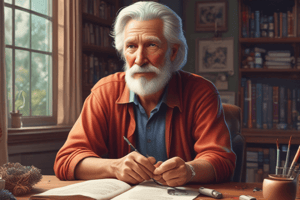Podcast
Questions and Answers
What is the main focus of Erikson's Psychosocial Theory?
What is the main focus of Erikson's Psychosocial Theory?
- Spiritual identity in late adulthood
- Social and emotional development throughout the lifespan (correct)
- Intellectual growth during adolescence
- Physical development at each stage
Which stage of Erikson's theory corresponds to the age range when children are typically in elementary school?
Which stage of Erikson's theory corresponds to the age range when children are typically in elementary school?
- Autonomy vs. Shame and Doubt
- Trust vs. Mistrust
- Intimacy vs. Isolation
- Industry vs. Inferiority (correct)
According to Erikson, what do teenagers primarily struggle with during the stage of Identity vs. Role Confusion?
According to Erikson, what do teenagers primarily struggle with during the stage of Identity vs. Role Confusion?
- Focusing on making contributions to society
- Finding a sense of identity and belonging (correct)
- Establishing intimacy with others
- Experiencing guilt for their actions
In Erikson's Psychosocial Theory, what is the key challenge faced by individuals in middle adulthood?
In Erikson's Psychosocial Theory, what is the key challenge faced by individuals in middle adulthood?
What is one criticism of Erikson's theory mentioned in the text?
What is one criticism of Erikson's theory mentioned in the text?
According to Erik Erikson's psychosocial theory, what motivates much of our behavior?
According to Erik Erikson's psychosocial theory, what motivates much of our behavior?
In contrast to Freud, Erikson emphasized the importance of which psychological element in determining our actions?
In contrast to Freud, Erikson emphasized the importance of which psychological element in determining our actions?
What is one primary difference between Erikson's and Freud's theories regarding motivation?
What is one primary difference between Erikson's and Freud's theories regarding motivation?
According to Erikson, what guides our actions more significantly than the id?
According to Erikson, what guides our actions more significantly than the id?
What are some of the psychosocial problems that Erikson believed motivate humans throughout life?
What are some of the psychosocial problems that Erikson believed motivate humans throughout life?
Flashcards
Erikson's Psychosocial Theory
Erikson's Psychosocial Theory
Focuses on social and emotional development throughout the lifespan, rather than just childhood.
Elementary School Age (Erikson)
Elementary School Age (Erikson)
Industry vs. Inferiority stage, where kids struggle with feeling competent or inadequate.
Teen Identity
Teen Identity
Identity vs. Role Confusion stage (Erikson), where teens seek to define who they are and their place in the world.
Middle Adulthood Challenge
Middle Adulthood Challenge
Signup and view all the flashcards
Erikson's Theory Criticism
Erikson's Theory Criticism
Signup and view all the flashcards
Erikson's Motivation
Erikson's Motivation
Signup and view all the flashcards
Erikson vs. Freud
Erikson vs. Freud
Signup and view all the flashcards
Erikson's Ego Emphasis
Erikson's Ego Emphasis
Signup and view all the flashcards
Psychosocial Problems (Erikson)
Psychosocial Problems (Erikson)
Signup and view all the flashcards
Study Notes
Erik Erikson's Psychosocial Theory
- Erik Erikson (1902-1994) proposed that our relationships and society's expectations motivate our behavior.
- He emphasized the importance of the ego (conscious thought) in determining our actions, rather than unconscious urges.
- Erikson is considered the father of developmental psychology due to his model covering the entire lifespan and highlighting primary psychological and social concerns throughout life.
Erikson's Expansion on Freud's Theory
- Erikson expanded on Freud's theory by emphasizing the importance of culture in parenting practices and motivations.
- He added three stages of adult development to his model.
Eight Stages of Psychosocial Development
- Trust vs. Mistrust (0-1): Infants must have basic needs met consistently to feel the world is trustworthy.
- Autonomy vs. Shame and Doubt (1-2): Toddlers learn basic independence by exercising newfound freedom.
- Initiative vs. Guilt (3-5): Preschoolers initiate activities, emphasizing "doing things all by myself."
- Industry vs. Inferiority (6-11): School-aged children focus on accomplishments and make comparisons with classmates.
- Identity vs. Role Confusion (adolescence): Teenagers experiment with roles, beliefs, and ideas to gain a sense of identity.
- Intimacy vs. Isolation (young adulthood): Individuals make long-term commitments in intimate relationships.
- Generativity vs. Stagnation (middle adulthood): People focus on being productive at work and home, motivated by wanting to make a contribution to society.
- Integrity vs. Despair (late adulthood): Individuals reflect on their lives, hoping to feel they've lived well and made a contribution.
Criticisms of Erikson's Theory
- Critics argue that the theory focuses too heavily on stages and assumes the completion of one stage is necessary for the next crisis of development.
- The theory is also criticized for focusing on social expectations that may not be universal across cultures.
Studying That Suits You
Use AI to generate personalized quizzes and flashcards to suit your learning preferences.
Description
Explore Erik Erikson's psychosocial theory of development, which emphasizes the role of relationships and conscious thought in shaping behavior. Learn how Erikson's perspective differs from Freud's focus on unconscious drives.




